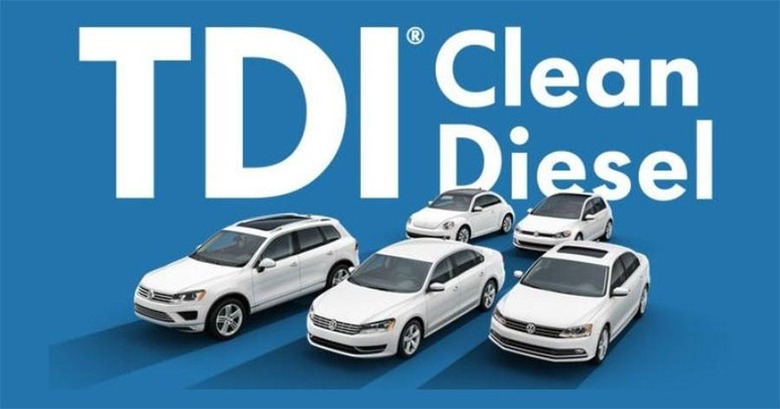Volkswagen Will Buy Back Most Dieselgate Cars In US
Volkswagen will offer to buy back every diesel car in the US that cheated emissions standards, a vast and expensive undertaking covering nearly half a million vehicles. The decision is part of a settlement in principle with the US Department of Justice (DoJ), Environmental Protection Agency (EPA), and California Air Resources Board (CARB), announced today, as part of the German automaker's grand "Dieselgate" mea-culpa for fitting several of its models with cunning bypass devices that helped fake the results during government testing.
The so-called "defeat device" was intended to kick in when the car's systems observed likely testing behaviors, and change the performance settings dramatically to reduce the output of gases like nitrogen oxide (NOx).
It worked, too, and to dramatic effect. Testing carried out by independent researchers discovered that the cars actually output as much as 35 times the US emissions limits, when the software wasn't running to rein in the pollutants.
The cheat brought the combined wrath of the US government and various independent lawsuits down on Volkswagen AG, the parent of Volkswagen of America, and today there's another step closer to reparations. Previously, VW had attempted to placate owners of cars with the 2.0-liter "Clean Diesel" TDI engines with a "Goodwill" program of gift cards and dealership discounts, but that gesture wasn't enough to satisfy regulators.
Instead, U.S. District Judge Charles Breyer confirmed today in the San Francisco District Court, VW will offer to buy back every implicated 2.0 liter car from owners in the country. Those who want to keep their vehicles will be offered a fix instead, and there's the promise of "substantial compensation" involved too.
Exactly what that compensation will be, how much VW will offer for each car, and what the fix will be remains to be seen, with Justice Breyer yet to reveal those details.

Some reports pegged a $5,000 payout to each owner as part of the deal, though the judge criticized those responsible for the leaks. If true, it could total an extra $1bn in expenses for Volkswagen.
The automaker will also fund efforts that "promote" environmentally-friendly driving and transportation, though again, no details have been shared as to what that will actually involve.
Tesla CEO Elon Musk was among a number of activists and clean-energy CEOs that petitioned the CARB in December last year to make Volkswagen's punishment one that would invest in green initiatives rather than something strictly punitive.
One significant concern among owners of dieselgate vehicles is that the driving dynamics of their cars will change significantly – and detrimentally – with fixes applied. That's because such retroactive repairs will likely limit power and other factors in an attempt to curtail emissions.
"Volkswagen is committed to earning back the trust of its customers, dealers, regulators and the American public," the company said after the hearing had concluded, suggesting that "these agreements in principle are an important step on the road to making things right."
"Volkswagen intends to compensate its customers fully and to remediate any impact on the environment from excess diesel emissions," the automaker continued. "As noted today in court, customers in the United States do not need to take any action at this time."
Still, that's not to say the ongoing legal saga is anywhere near over. "The arrangements in the making in the United States will have no legal bearing on proceedings outside of the United States," Volkswagen AG pointed out today.
That means owners of VW and Audi diesels affected by the TDI issue who aren't based in the US are still yet to hear exactly what will happen to their cars. With an estimated eleven million vehicles using the defeat device, that's a lot of people still waiting to hear what Volkswagen plans to do.
Similarly, "ongoing investigations by the Department of Justice, Criminal Division, and the State Attorneys General are not prejudiced by these agreements in principle," Volkswagen AG has clarified.
The FTC said in March that it would sue Volkswagen for "misleading" advertising in the US.
Owners of 3.0 liter TDI cars are also awaiting news of what will happen with their vehicles, since they're not covered by today's announcement. Volkswagen submitted a draft proposal covering that engine – which has appeared in select VW, Audi, and Porsche cars – back in February.
There's fallout in the broader auto industry, too, with the EPA having confirmed earlier that it will now be putting diesel cars through more stringent testing. Previously, the organization accepted manufacturer testing and conducted spot-tests to ensure that results were being fairly reported.
Earlier estimates suggested Volkswagen AG was preparing a $21bn fund to cover its dieselgate expenses, though there's no way to know at this stage whether that's anywhere close to covering the actual costs – nor, whether this newest settlement proposal will be enough to turn around goodwill with customers.
